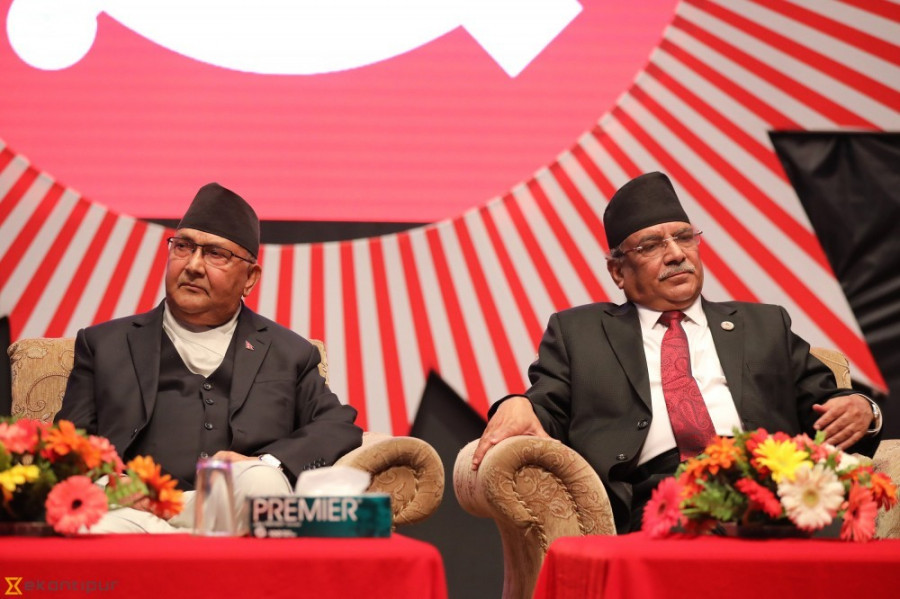Politics
Feud continues in the ruling party as Oli-Dahal talks fail
Both leaders maintain their position but none wants to be seen as the trigger for a party split.
Tika R Pradhan
Amid pressure from party members to save the party unity, two chairs of the ruling Nepal Communist Party, KP Sharma Oli and Pushpa Kamal Dahal, on Sunday decided to buy time, agreeing to sit for talks once again on Monday morning.
The ruling party is on the verge of a split due to increasing polarisation.
On Sunday, Oli and Dahal held a meeting at Baluwatar in search of a common ground but failed, as both refused to budge from their stances.
Dahal maintained that Oli must resign both as party chair and prime minister, while the latter refused.
“The two leaders had a heated discussion before both of them decided to talk things out,” said a leader who was present in the meeting. “They discussed all the disputed issues. Since there was no agreement, they decided to continue with the talks.”
The crisis in the party has deepened lately, after Oli publicly alleged that the rival faction, led by Dahal, Madhav Kumar Nepal and Jhala Nath Khanal, was trying to unseat him and that plots were also being hatched in New Delhi. As many as 30 out of 44 Standing Committee members have demanded that Oli resign both as party chair and prime minister.
As pressure mounted on him, Oli on Thursday suddenly prorogued the House, raising concerns in the rival faction if he was planning to split the party through an ordinance.
A day later, Oli and Dahal held a meeting at Baluwatar, only to agree to disagree. They were scheduled to sit for talks on Saturday just ahead of the scheduled Standing Committee meeting.
The Standing Committee meeting, however, was postponed until Monday after both the leaders sought more time for discussions. The meeting did not happen. Instead, Oli suddenly met with the President and thereafter briefed his ministers, alleging that the rival faction was hatching a plot to unseat him both as party chair and prime minister and impeach the President.
The prime minister, according to insiders, became suspicious after the rival faction started holding a series of meetings.
In one of the meetings held at Jhamsikhel, 30 Standing Committee members, including Dahal, had devised a strategy to force Oli to capitulate, according to a leader present in the meeting.
“Oli also learned that the Dahal-Nepal faction was discussing bringing an impeachment motion against the President,” the leader said.
At Saturday’s briefing, Oli had even asked his ministers to be prepared for “any action” and make their position clear–as to whether they were with him or the rival faction.
Oli’s reported meetings with Sher Bahadur Deuba, the leader of the main opposition Nepali Congress, too have concerned the Dahal-Nepal faction, insiders say.
“Oli’s activities and statements of late have given ample room for suspicion,” said Surendra Pandey, a Standing Committee member. “The more controversial moves Oli makes, the deeper he will plunge into the crisis. He seems to have realised today that dialogue is the only way.”
According to Pandey, the most important thing that Oli needs to realise is he should abide by party decisions.
Subas Nembang, a Standing Committee member and close confidante of Oli, said that not everything has gone out of hand yet.
“The two leaders have started to talk, which is a positive development,” Nembang told the Post. “It may take some time, but things could be settled, as most of the party leaders are for saving the party unity.”
Leaders, however, could not say what exactly could save the party from splitting.
Though Oli seems to be in a mood to make a concession and hand over the executive chairmanship to Dahal in its letter and spirit, the Dahal faction says things have moved beyond that.
Even though the two leaders in November 2019 had reached a deal that Oli would lead the government for the full five-year term and Dahal would run the party as “executive chairman”, Oli did not abide by the understanding.
At Friday’s meeting, Dahal pressed Oli to uphold the May 2018 gentleman’s agreement, which said both of them would lead the government in turn–two and a half years each. If this agreement is to be upheld, Oli should make way for Dahal.
Leaders say regardless of their confrontation, neither Oli nor Dahal wants to be perceived as the cause for the party split, hence there is no alternative to an agreement.
“It may take a while, but both the factions will work to iron out the differences, as no one wants to become the cause for the party split,” said Haribol Gajurel, a Standing Committee member. “Oli provoked the Dahal-Nepal faction and then hanged the sword of party split over everyone’s head. The Dahal-Nepal faction, however, is for maximum effort to save the unity.”




 10.12°C Kathmandu
10.12°C Kathmandu















